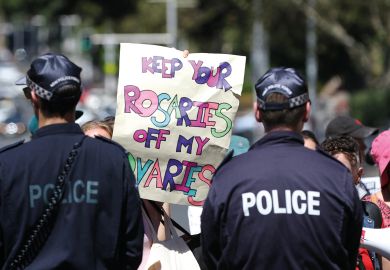At least 13 current members of staff in the department at the University of Surrey are in “at risk” positions and only six jobs will remain under the new structure.
After hearing the news, course graduates started a Twitter campaign, Facebook group and an online petition that described the changes as an “effective closure” of the department.
But the university has maintained that no courses will close and the changes are needed to make the department more “financially stable”.
David Ashton, vice-president and registrar of the University of Surrey, wrote to all students on 13 March to tell them that the university will be merging the Faculty of Business, Economics and Law with the Faculty of Arts and Human Sciences at the end of this academic year.
The email said that the university has no plans to close any departments or courses, but that there would be “some changes to staff” and disruption to students would be minimised.
Surrey said it was planning on cutting the number of posts it had in the politics department from 14 to six, although none of the 13 current staff members have yet been issued with a notice of redundancy.
Over the weekend, politics graduates took to Twitter to start a campaign using the handle @SurreyPolGrads to express their support for the department and retweet information about what was happening. Their Save Surrey Politics page on Facebook has more than 1,575 likes and a petition has reached about 800 signatures.
In a post on the Facebook group the university commented that it “never had any intention of closing” the department.
In a statement to Times Higher Education, Surrey’s vice-chancellor, Sir Christopher Snowden, said that the proposals for the department were part of a “wider review” of university’s future and how to “maintain excellence across all areas in light of the challenging financial circumstances facing the higher education sector”.
He added: “Through our analysis, it is clear that we need to develop a more financially sustainable base for the department of politics. We are proposing to reduce the staff numbers in the department in order to sustain a viable staff-student ratio.”
Sir Christopher added that the proposals “refocus the department on its current strengths” of delivering a high-quality experience and aim to “improve its research performance and ability to generate more research income”.
“We are confident that, post-restructuring, the department will regrow to be a successful subject with strong teaching and research, which is attractive to well-qualified student and staff applicants,” Sir Christopher said.
The department ranked 50th out of 56 politics and international studies departments in the research excellence framework with a grade point average of 2.08.
Register to continue
Why register?
- Registration is free and only takes a moment
- Once registered, you can read 3 articles a month
- Sign up for our newsletter
Subscribe
Or subscribe for unlimited access to:
- Unlimited access to news, views, insights & reviews
- Digital editions
- Digital access to THE’s university and college rankings analysis
Already registered or a current subscriber? Login



